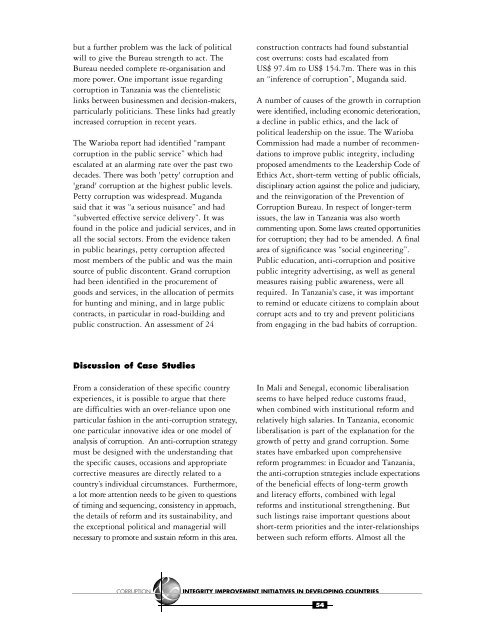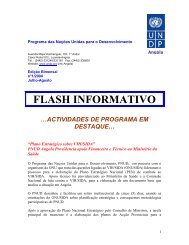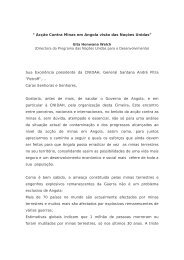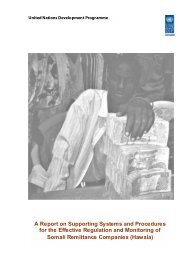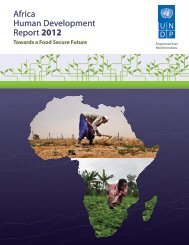CORRUPTION AND ANTI-CORRUPTION STRATEGIES ... - UNDP
CORRUPTION AND ANTI-CORRUPTION STRATEGIES ... - UNDP
CORRUPTION AND ANTI-CORRUPTION STRATEGIES ... - UNDP
You also want an ePaper? Increase the reach of your titles
YUMPU automatically turns print PDFs into web optimized ePapers that Google loves.
ut a further problem was the lack of political<br />
will to give the Bureau strength to act. The<br />
Bureau needed complete re-organisation and<br />
more power. One important issue regarding<br />
corruption in Tanzania was the clientelistic<br />
links between businessmen and decision-makers,<br />
particularly politicians. These links had greatly<br />
increased corruption in recent years.<br />
The Warioba report had identified “rampant<br />
corruption in the public service” which had<br />
escalated at an alarming rate over the past two<br />
decades. There was both 'petty' corruption and<br />
'grand' corruption at the highest public levels.<br />
Petty corruption was widespread. Muganda<br />
said that it was “a serious nuisance” and had<br />
“subverted effective service delivery”. It was<br />
found in the police and judicial services, and in<br />
all the social sectors. From the evidence taken<br />
in public hearings, petty corruption affected<br />
most members of the public and was the main<br />
source of public discontent. Grand corruption<br />
had been identified in the procurement of<br />
goods and services, in the allocation of permits<br />
for hunting and mining, and in large public<br />
contracts, in particular in road-building and<br />
public construction. An assessment of 24<br />
Discussion of Case Studies<br />
From a consideration of these specific country<br />
experiences, it is possible to argue that there<br />
are difficulties with an over-reliance upon one<br />
particular fashion in the anti-corruption strategy,<br />
one particular innovative idea or one model of<br />
analysis of corruption. An anti-corruption strategy<br />
must be designed with the understanding that<br />
the specific causes, occasions and appropriate<br />
corrective measures are directly related to a<br />
c o u n t r y ’s individual circumstances. Furthermore,<br />
a lot more attention needs to be given to questions<br />
of timing and sequencing, consistency in approach,<br />
the details of reform and its sustainability, and<br />
the exceptional political and managerial will<br />
necessary to promote and sustain reform in this area.<br />
construction contracts had found substantial<br />
cost overruns: costs had escalated from<br />
US$ 97.4m to US$ 154.7m. There was in this<br />
an “inference of corruption”, Muganda said.<br />
A number of causes of the growth in corruption<br />
were identified, including economic deterioration,<br />
a decline in public ethics, and the lack of<br />
political leadership on the issue. The Warioba<br />
Commission had made a number of recommendations<br />
to improve public integrity, including<br />
proposed amendments to the Leadership Code of<br />
Ethics Act, short-term vetting of public officials,<br />
disciplinary action against the police and judiciary,<br />
and the reinvigoration of the Prevention of<br />
Corruption Bureau. In respect of longer-term<br />
issues, the law in Tanzania was also worth<br />
commenting upon. Some laws created opportunities<br />
for corruption; they had to be amended. A final<br />
area of significance was “social engineering”.<br />
Public education, anti-corruption and positive<br />
public integrity advertising, as well as general<br />
measures raising public awareness, were all<br />
required. In Tanzania's case, it was important<br />
to remind or educate citizens to complain about<br />
corrupt acts and to try and prevent politicians<br />
from engaging in the bad habits of corruption.<br />
In Mali and Senegal, economic liberalisation<br />
seems to have helped reduce customs fraud,<br />
when combined with institutional reform and<br />
relatively high salaries. In Tanzania, economic<br />
liberalisation is part of the explanation for the<br />
growth of petty and grand corruption. Some<br />
states have embarked upon comprehensive<br />
reform programmes: in Ecuador and Tanzania,<br />
the anti-corruption strategies include expectations<br />
of the beneficial effects of long-term growth<br />
and literacy efforts, combined with legal<br />
reforms and institutional strengthening. But<br />
such listings raise important questions about<br />
short-term priorities and the inter-relationships<br />
between such reform efforts. Almost all the<br />
<strong>CORRUPTION</strong>& INTEGRITY IMPROVEMENT INITIATIVES IN DEVELOPING COUNTRIES<br />
5 4


